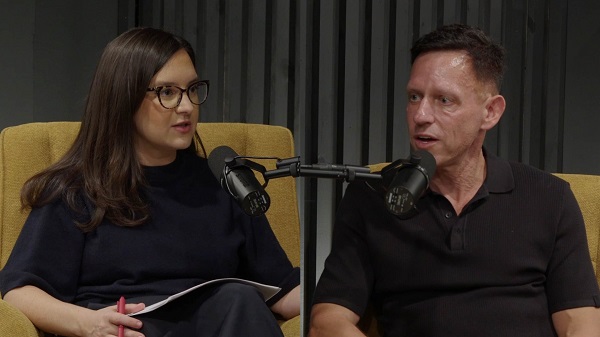Opinion
Peter Thiel: The Silicon Valley billionaire made big—and early—bets on Trump and J.D. Vance. What did he see that so many didn’t?

News release from The Free Press
Triumph of the Counter-Elites
|
On Tuesday night, Donald Trump announced that the richest man in the world, Elon Musk, along with the entrepreneur Vivek Ramaswamy, will head a new initiative in the Trump administration: the Department of Government Efficiency, or “DOGE.” Internet meme culture has now landed in the White House. Dogecoin is a memecoin—and if you don’t understand that sentence, fear not—I am sure Nellie will cover it in TGIF tomorrow. But what the announcement solidifies—if Trump’s win hadn’t already—is the triumph of the counter-elite. A bunch of oddball outsiders ran against an insular band of out-of-touch elites supported by every celebrity in Hollywood—and they won. They are about to reshape not just the government, but also the culture in ways we can’t imagine. How they did that—and why—is a question that I’ve been thinking about nonstop since Tuesday. And there was one person, more than any other, who I wanted to discuss it with. He is the vanguard of those antiestablishment counter-elites: Peter Thiel. If you listened to my last conversation with the billionaire venture capitalist a year and a half ago on Honestly, you’ll remember that Peter was the first person in Silicon Valley to publicly embrace Trump in 2016. That year, he gave a memorable speech at the Republican National Convention that many in his orbit thought was simply a step too far. He lost business at Y Combinator, the start-up incubator where he was a partner. Many prominent tech leaders criticized him publicly, like VC and Twitter investor Chris Sacca, who called Thiel’s endorsement of Trump “one of the most dangerous things” he had ever seen. A lot has changed since then. For one, Thiel has taken a step back from politics—at least publicly. He didn’t donate to Trump’s campaign. There was no big RNC speech this time around. But the bigger change is a cultural one: He’s no longer the pariah of Silicon Valley for supporting Trump. There’s Bill Ackman, Marc Andreessen, David Sacks, Shaun Maguire, and Elon Musk, among many other tech titans who have joined the Trump train. On the surface, Thiel seems full of contradictions. He is a libertarian who has found common cause with nationalists and populists. He invests in companies that have the ability to become monopolies, and yet Trump’s White House wants to break up Big Tech. He is a gay American immigrant, but he hates identity politics and the culture wars. He pays people to drop out of college, but still seems to venerate the Ivy League. But perhaps that’s the secret to his success. He’s beholden to no tribe but himself, no ideology but his own. And why wouldn’t you be when you make so many winning bets? From co-founding PayPal and the data analytics firm Palantir (which was used to find Osama bin Laden) to being the first outside investor in Facebook—Thiel’s investments in companies like LinkedIn, Palantir, and SpaceX have paid off, to say the least. His most recent bet—helping his mentee J.D. Vance get elected senator and then on the Trump ticket—seems also to have paid off. The next four years will determine just how high Thiel’s profit margin will be. On Honestly, Thiel explains why so many of his peers have finally come around to Trump; why he thinks Kamala—and liberalism more broadly—lost the election; why the Trump 2.0 team, with antiestablishment figures willing to rethink the system, will be better than last time. We talk about the rise of historical revisionism, the blurry line between skepticism and conspiracy, and his contrarian ideas about what we might face in a dreaded World War III. Click below to watch the full-length video.
Invite your friends and earn rewards |
Bruce Dowbiggin
WOKE NBA Stars Seems Natural For CDN Advertisers. Why Won’t They Bite?

The wonderful people who brought you Elbows Up and Don’t Shop At Home Depot! are now on to Edmonton Oilers Bring Home The Cup. In response to no Canadian-based team winning the Stanley Cup since 1993 the corporate nostalgia folks are linking arms with Connor McDavid & Co in their struggle with the dastardly Florida Panthers. The Oil are now Canada’s team!
In one bit they were taking ice shavings from McDavid’s home rink in southern Ontario to mix with the frozen Zamboni water of Edmonton’s Rogers Place arena. Okay, they have eight players on the Oilers roster who aren’t Canadian (hello Leon Draisaitl), and the stars now killing it for the Panthers, Sam Bennett and Brad Marchand, are from Ontario. But never mind. Like playing Mr. Dressup trivia with Mike Meyers it’s just too good an idea to waste.
The outcome of all this patriotic wind therapy will be determined Tuesday— or Thursday at the latest. But it will have achieved the desired goal of warming the cockles of all those Canadians who turtled in the election, flipping back to Mark Carney’s Liberals when the going got a little rough with Donald Trump. Resulting in a maximum four more years of Carney’s faculty lounge of dunces and Kamala Harris clones.
While the marketers were playing the Maple Syrup March over the Stanley Cup Final they missed an even better opportunity to marry Canadian patriotism with sport. We speak, of course, of the inevitable crowning of Canadian stars as champions of the NBA. In fact the entire progress of the postseason in the sneaker league has witnessed great Canadian results.
Not least of which: Hamilton’s Shai Gilgeous Alexander winning the NBA MVP while leading his Oklahoma City Thunder to the brink of the NBA crown. For those distracted by Stu Skinner and Corey Perry, SGA is a revelation, If you missed him leading Canada back to the Olympics last year the wiry 26-year-old is a lithe, unstoppable chinook who routinely scores 30 points a game.

He has help from another Canadian, Montreal’s Lu Dort, a finalist for NBA defensive player of the year, who also led Canada to the Olympics. As unstoppable as SGA is, Dort is immovable. But that’s not all the Canadian content. In the Finals they are up against two more Canadian teammates from last year. Aurora Ont.’s Andrew Nembhard is the back-court catalyst for Tyrese Haliburton’s Indian Pacers, taking them to the Eastern title and within two wins of the NBA title. He’s assisted by another Canadian, Montreal’s Benedict Mathurin, the hero of the Game 3 win for the Pacers. They’re now household names.

The Canadian content didn’t end there, either. In the semifinals, the Thunder beat the Minnesota Timberwolves featuring SGA’s cousin Nickeil Alexander-Walker , another alumnus of the CDN national team. At one point the two close friends were anything but friendly, shoving each other under the basket.
They had Canadian company in the postseason. In earlier rounds R.J. Barrett and the New York Knicks made it to the second round in the East, Jamal Murray’s Denver Nuggets fell to the Thunder in Round Two, while the Houston Rockets and Mississauga’s Dillon Brooks, a tenacious physical presence, lost to Steph Curry’s Golden State Warriors . Meanwhile, Corey Joseph’s Orlando Magic lost in the first round to Boston.
But the Canadian content didn’t end there. The Toronto Raptors, NBA champs of 2019, are now spread throughout the league, affording nostalgic Canadian fans a rooting playoff interest in players such as Pascal Siakim, who’s pairing with Nembhard and Mathurin to push the upset-minded Pacers, shooting guard OG Anunoby teamed with small forward R.J. Barrett on the Knicks and point guard Fred Van Vliet of the Rockets. All harkened back to the Raptors’ greatest days.
But in the heat of Elbows Up marketing these great performances don’t seem to get a sniff from marketers looking to promote Canadian unity in these fractious days. While the sports networks give airtime to the stories in the Association. the general public and advertisers have little time or inclination to draw patriotic strength from these young men.
Before we completely condemn Canadian marketers it should be noted that the interest in the NBA in general is waning. The NBA has lost 75 percent of its TV audience since the Michael Jordan peak while many other sports — NFL, men’s & women’s college basketball, college football — have set record TV ratings. Yes, TV ratings in many fields have dropped since the 1990s. Still, it seems significant.
The problem for the NBA in a Time of Trump is its embrace of hard-left politics. Whether it’s LeBron James defending Chinese shoe manufacturers, the slavish devotion to #BLM even as its corruption is revealed and a maniacal obsession with Donald Trump (and embrace of Kamala Harris) the NBA has made its bed with radical political and cultural elements. It’s as if the Trump election and cultural shift never happened.
In this wilful blindness they are supported by their media partners whose own credibility is at an all-time low after carrying water for the Biden farce and Kamala’s erasure. Ironically, this is the same political crash car running Canadian politics at the moment. You’d think that would make the NBA— and its sister Women’s NBA—like catnip to the Canada Not For Sale crew.
So far the hockey quest is foremost in their minds. But perhaps when SGA holds the Larry O’Brien Trophy they might just achieve the symbiosis that the sport has always coveted.
Bruce Dowbiggin @dowbboy is the editor of Not The Public Broadcaster A two-time winner of the Gemini Award as Canada’s top television sports broadcaster, his new book Deal With It: The Trades That Stunned The NHL And Changed hockey is now available on Amazon. Inexact Science: The Six Most Compelling Draft Years In NHL History, his previous book with his son Evan, was voted the seventh-best professional hockey book of all time by bookauthority.org . His 2004 book Money Players was voted sixth best on the same list, and is available via brucedowbigginbooks.ca.
Crime
Minnesota shooter arrested after 48-hour manhunt

 MxM News
MxM News
Quick Hit:
Vance Luther Boelter, accused of killing former Minnesota State House Speaker Melissa Hortman and her husband, was captured Sunday after leading law enforcement on a 48-hour manhunt.
Key Details:
-
Boelter allegedly began his rampage around 2 a.m. Saturday at Sen. Hoffman’s Champlin home, shooting both the senator and his wife, Yvette. The couple survived after emergency surgery.
-
He then traveled to Rep. Melissa Hortman’s Brooklyn Park home, where she was pronounced dead at the scene and her husband died shortly afterward at a hospital.
-
The suspect reportedly sent a farewell message to friends before fleeing and was later arrested in a Sibley County field Sunday night.
Sources provided this photo of Boelter from the scene after his arrest. pic.twitter.com/q4F9uPkm53
— Liz Collin (@lizcollin) June 16, 2025
Diving Deeper:
Vance Luther Boelter, the man accused of carrying out a targeted shooting of Democrat lawmakers in Minnesota, was taken into custody Sunday night following a 48-hour manhunt that spanned multiple counties. According to a report from Alpha News, Boelter was arrested in a field in rural Sibley County after evading police for more than a day following the deadly shootings.
Boelter, 57, previously served as an appointee under Gov. Tim Walz and is accused of murdering former Minnesota House Speaker Melissa Hortman and injuring State Senator John Hoffman and his wife, Yvette. Authorities say Boelter disguised himself as a police officer—complete with a uniform, ballistic vest, and Halloween mask—before launching the coordinated attacks early Saturday morning.
The violence began just after 2 a.m. when Boelter allegedly entered the Hoffman residence in Champlin and opened fire. Both the senator and his wife were struck multiple times. Their daughter, Hope, was reportedly shielded from the gunfire by her mother. The couple’s nephew confirmed that both John and Yvette Hoffman underwent surgery and were listed in stable condition by Sunday.
From there, Boelter allegedly drove to Brooklyn Park and carried out a second attack at the home of Speaker Emerita Hortman. The 55-year-old lawmaker was found dead inside the home, while her husband was transported to a hospital where he later succumbed to his injuries.
Brooklyn Park police officers, alerted by the earlier incident, arrived as Boelter was leaving the Hortman residence. A standoff ensued, with officers briefly cornering the suspect inside the house and opening fire, though Boelter managed to flee.
Boelter reportedly sent a chilling text message to close friends. “David and Ron, I love you guys. I made some choices, and you guys don’t know anything about this, but I’m going to be gone for a while,” he wrote. “May be dead shortly, so I just want to let you know I love you guys both and I wish it hadn’t gone this way.”
-

 Crime1 day ago
Crime1 day agoManhunt on for suspect in shooting deaths of Minnesota House speaker, husband
-

 Business17 hours ago
Business17 hours agoCarney’s European pivot could quietly reshape Canada’s sovereignty
-

 Alberta17 hours ago
Alberta17 hours agoAlberta’s grand bargain with Canada includes a new pipeline to Prince Rupert
-

 conflict3 hours ago
conflict3 hours ago“Evacuate”: Netanyahu Warns Tehran as Israel Expands Strikes on Iran’s Military Command
-

 Bruce Dowbiggin1 hour ago
Bruce Dowbiggin1 hour agoWOKE NBA Stars Seems Natural For CDN Advertisers. Why Won’t They Bite?
-

 Energy2 hours ago
Energy2 hours agoCould the G7 Summit in Alberta be a historic moment for Canadian energy?
-

 Crime2 hours ago
Crime2 hours agoMinnesota shooter arrested after 48-hour manhunt








